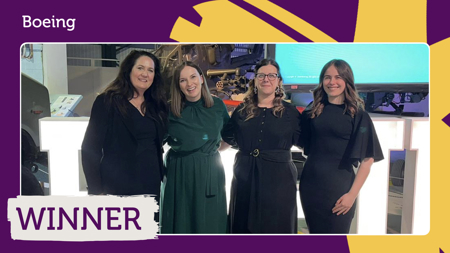

Boeing
With the global aerospace industry facing a shortage of skilled aviation professionals, and a predicted need for more than 700,000 maintenance technicians worldwide by 2035, Boeing knew it had to develop a pipeline of highly skilled technicians to meet the increasing demand for services and plug the skills gap.
The result is the “impressive” Boeing Advanced Aircraft Maintenance Apprenticeship Programme, operated from the International Centre for Aerospace Training. It offers the “complex training” needed to deliver world-class engineering maintenance services and meet the demands of the future.
A core aspect of the programme is Boeing’s efforts in levelling the playing field by addressing the socio-economic challenge of location versus opportunity that can prevent candidates from relocating for training opportunities. It does this by funding accommodation for the first year while also providing the pastoral enablement apprentices need.
Furthermore, apprentices are integrated into the wider early-careers population and are included in all activities, “embedding the notion that apprentices are on an equal footing to graduates”. Since 2018, 82 apprentices have been through or are currently on the programme, and graduated apprentices can progress to join Boeing’s Executive Sponsored Engineering Career Foundation Programme.
Sue Paternoster, senior HR manager for the UK and Ireland at Boeing, said: “Investing in apprenticeships for aircraft maintenance technicians not only nurtures future talent but also addresses the industry’s evolving needs by addressing skills shortages and providing hands-on learning experiences. By promoting diversity and inclusion throughout the programme, we enrich our workforce while fostering loyalty and engagement among employees. This proactive approach ensures a skilled and inclusive workforce, contributing to industry growth and employee satisfaction.”
The judges said the results of the scheme “speak for themselves”, with 100 per cent of participants securing a position on completion and 70 per cent remaining with the company after five years. “In particular, we were impressed with the support provided to apprentices, including relocation, wraparound and ongoing pastoral support,” the panel added. “It was also impressive to hear that they maintained delivery and support during the pandemic.”